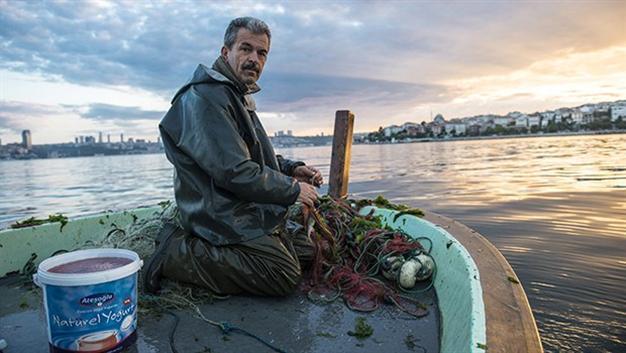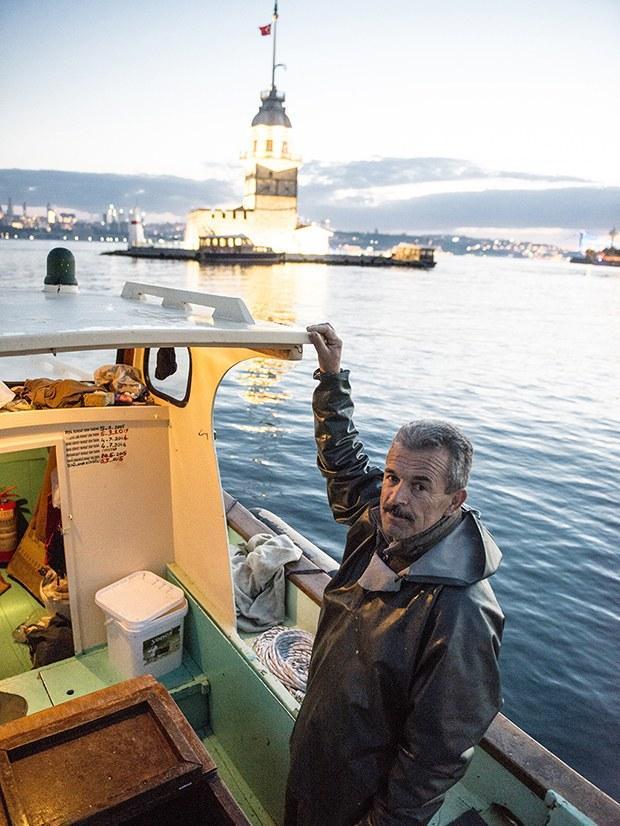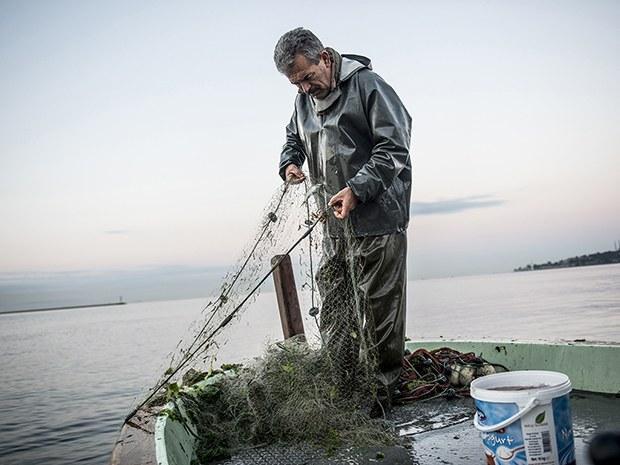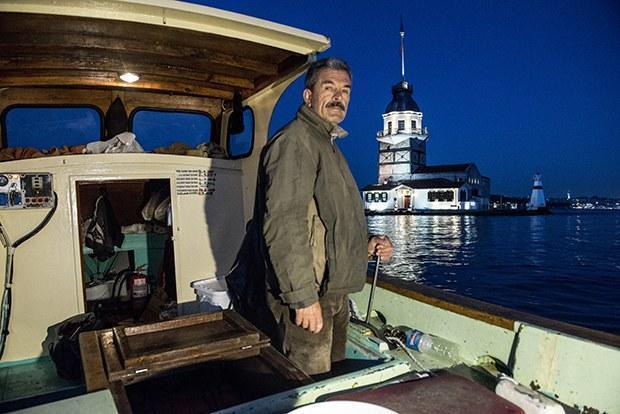4 a.m. fishing with the Bohemian philosopher of the Bosphorus
Yücel SÖNMEZ

Photo: Emre Yunusoğlu
Captain Mesut, born and raised in Üsküdar, has been fishing since his childhood. Witnessing and recording each change in its waters, he has grown increasingly concerned about its future.The coast of Üsküdar: The Maiden’s Tower shines like a pear on the calm waters before me, and the full moon slides past the historical peninsula’s minarets. Even the ecstasy of those dancing to traditional folk music on the shore does not distract me from the panorama. When I turn my head to the right toward the dancing group, I see tall skyscrapers in the background. Right at this moment, the person I am waiting for arrives. He is a fisherman of the Bosphorus since his childhood: Mesut Soydaner, known as Captain Mesut.
“You are more beautiful than last time,” he says, pointing to the moon setting over the Hagia Sophia. “I look at this panorama everyday. Even when I am fishing.”

Captain Mesut has not been able to leave the Bosphorus since his childhood, which he spent at its shores. Almost all 61 years of his life have taken place on these waters.
Mesut left university, where he studied business management, after his third year, and now looks after himself as a fisherman of 34 years. “Fishing is a bohemian job,” he says. “Maybe that’s why I liked it. I left university and never thought of it again.”
Mesut was able to raise and educate both of his sons through his fishing, and he sees the Bosphorus differently than many others in Istanbul: both with love and gratitude.
He has kept a diary of these past 34 years, detailing which fish were in the Bosphorus, where and when they passed at each time. Now his diary even sheds light on academic research: Mesut exchanges notes with underwater biologists.
At sunrise, a certain melancholy becomes apparent in his face. “Aren’t you going to resign?” I ask. “When the last fish dies,” he answers, motioning toward the skyscrapers. Then he nods.
“As an Indian said, when the last fish dies, we’ll understand that money isn’t edible,” Mesut says. “I wish that we could have understood that we eat fish, not money. Maybe then we would know the value of the sea.”

We lay the 400-meter long net to the still-dark waters of the Bosphorus. His actions come with the confidence of experience. He warns me, mockingly, “Never write where we dropped our net.”
Before I can even ask, Mesut offers more details on the changes he has witnessed.
“Ninety percent of both the fish and Bosphorus are gone,” he explains. In his childhood, he relates, he used to watch this water from a jetty: “It was like an aquarium, full of fish…clear, rich and shiny.” Mesut stresses that this is no longer the case.
“We destroyed the ecologic balance,” he says, while laying out his methods. “I sometimes use a fishing rod. Depending on the depth, sometimes there are 3-and-a-half kilograms of weight attached to it. When I pull the weight back, it turns black. Now there’s a sewer at the bottom of the Bosphorus.”
Mesut has experienced firsthand what this means. “We polluted the Bosphorus too much with our waste, and the fish deserted us,” he says. “Swallows, bream, horse mackerels, silverbacks, lobsters, swordfish… all of them are gone.” He says that now he only sees scorpion fish, bluefish, and tuna, all of which also face extinction. The last time he caught a Bonito was in 1985, he remembers. “I know they still pass through the Bosphorus, but they don’t breed here anymore.”
After a moment of silence, it’s time to check the nets. He pulls the net out, facing towards the sunrise over the historical peninsula. We were only able to catch a few kilograms of red mullet. “Greed and our changing relationships caused this situation,” he says.
“Why has it happened like that?” I ask. From his silence, I understand that he finds my question too naive. He points at the skyscrapers beside him, and then at the wall between Üsküdar’s coastal road and the sea.
“Look,” he says. “There’s no cove or coast anymore. The rivers that used to flow into the Bosphorus in the past are no longer.” Without looking, he points to the skyscrapers again. “It’s as if a child is drawing on a paper. As the city rose, the water below became darker. I saw it day by day.”
Mesut says he sees the same root cause behind the construction of skyscrapers and the pollution of the sea. “Our lifestyle has changed. The tolerant and helpful relationship between people is no more,” he says, remembering his childhood, when his mother used to clean a mosque with her Bulgarian neighbor. “But now there is no such tolerance. Everybody is in competition with each other. Skyscrapers are the symbol of this rivalry. When the relationship between humans is damaged, you can drain seas and destroy forests,” he says.

We watch Istanbul, between both coasts: The skyscrapers on one, the historical peninsula on the other. After sunrise, the city’s hustle and bustle increases. I understand that this city has become too crowded to remain calm at any hour.
We dock at the Maiden’s Tower to look over the fish caught in our nets.
“You know what?” Mesut asks. “Now there are sea breams in the Bosphorus. Last year, I even caught a sea turtle. I have held account of the Bosphorus for 34 years, but I do not understand it anymore.”
Translated by Yunus Yüzsüren
Edited by Delphine Rodrik
















